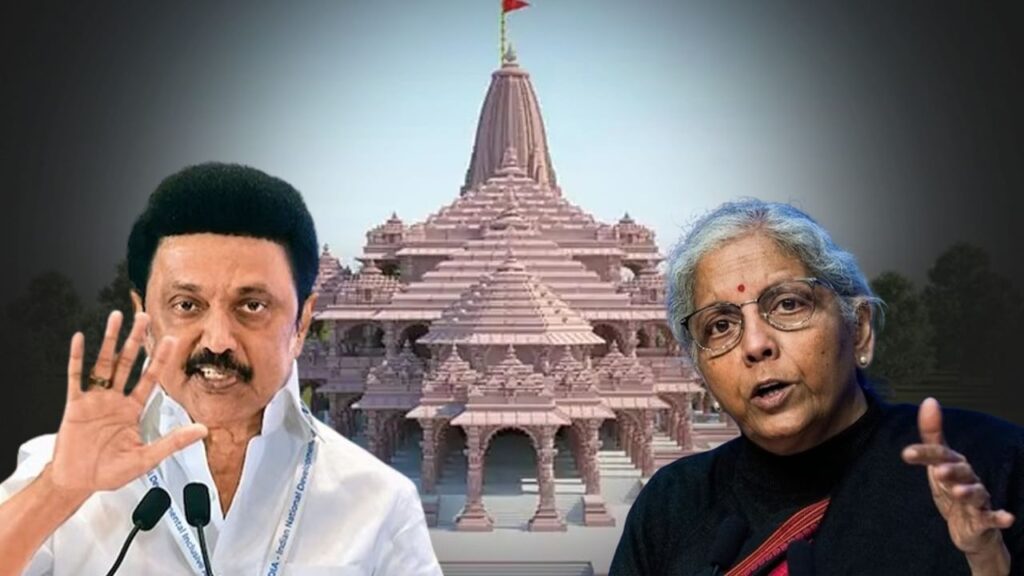News Desk, Kolkata : The inauguration of the Ram Temple in Ayodhya is set to take place at night, with Prime Minister Narendra Modi presiding over the consecration ceremony. The event has not only captured the attention of the nation but has also become a global spectacle, as various temples, including the Ram Temple, are illuminated in a vibrant display of lights. Special prayers and rituals have commenced, marking the beginning of a significant religious celebration.
However, in Tamil Nadu, a contrasting stance seems to be unfolding. The state government, led by Chief Minister Stalin, has allegedly issued a directive prohibiting live telecasts of the Ayodhya Ram Temple ceremony from January 22 to 24. This decision has sparked criticism from central Finance Minister Nirmala Sitharaman, who expressed her discontent through a tweet. She accused the Stalin government of stifling religious freedom and condemned the move to restrict celebrations in over 200 temples in Tamil Nadu, claiming it to be an anti-Hindu and reprehensible act.
The Finance Minister’s tweet underscored the growing tension between the central and state governments regarding the celebration of the Ram Temple inauguration. Sitharaman vehemently denounced Stalin’s administration for suppressing Hindu festivities, describing the decision as a severe affront to religious practices. The dispute has intensified, with the central government accusing the Tamil Nadu government of overstepping its authority and infringing upon the constitutional right to freedom of religion.
Stalin’s government, however, vehemently denies the allegations, asserting that there is no ban on Ram Puja in Tamil Nadu. Seetharman, the Minister for Hindu Religious and Charitable Endowments, rebuffs the claims made by the central minister, describing them as baseless and misleading. The state government contends that it has not imposed any restrictions on religious activities and accuses central ministers of spreading false information to incite discord.
The controversy has further deepened as the police in Tamil Nadu are reported to be shutting down events organized by various organizations, threatening them with dire consequences if they do not comply. The authorities have allegedly warned these organizations to dismantle their decorations and cancel their events, sparking fear and resentment among the local Hindu community.
The clash between the central and state governments over the celebration of the Ayodhya Ram Temple inauguration reflects a broader struggle between political ideologies and religious sentiments. While the central government seeks to project a unified narrative of cultural and religious pride, the state government in Tamil Nadu appears to be cautious about potential communal tensions and has taken measures to control public expressions of fervor.
As the political sparring continues, citizens are left caught in the crossfire between the central and state governments. The clash over the celebration of the Ayodhya Ram Temple inauguration has evolved into a symbol of the larger ideological tug-of-war in India, where religious sentiments are entangled with political agendas. The nation watches with bated breath as the confrontation unfolds, wondering whether a resolution can be reached that respects both religious freedom and the need for public order.
In the midst of this turmoil, the narrative of unity and diversity, a cornerstone of India’s identity, is put to the test. The celebration of the Ayodhya Ram Temple inauguration, intended to be a moment of collective joy, has become a battleground for conflicting political interests. Only time will reveal whether the clash will be resolved amicably or further escalate, leaving a lasting impact on the nation’s social and political fabric.
DISCLAIMER
Our news media denounces any form of bias and disapproves of sensationalism. The disseminated news is entirely educational and aimed at social awareness. Our media maintains absolute impartiality, adhering solely to the purpose of education and social consciousness.


